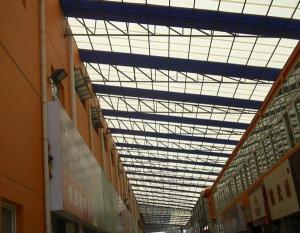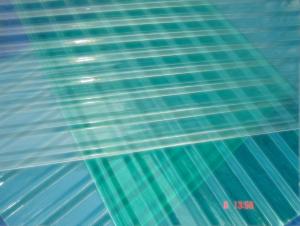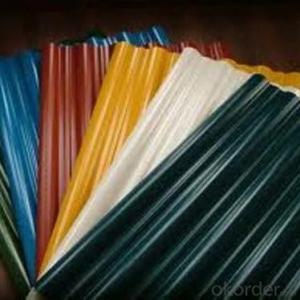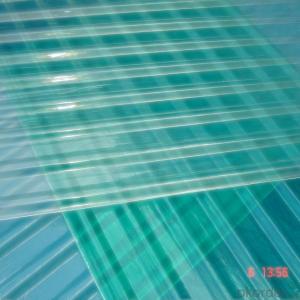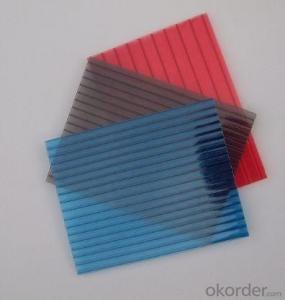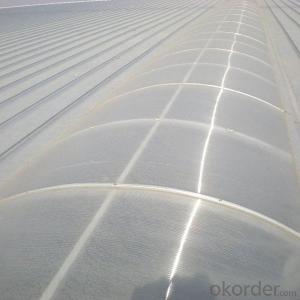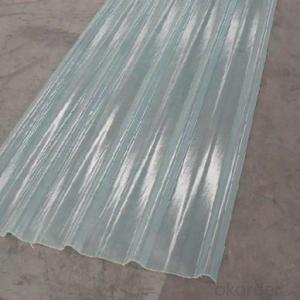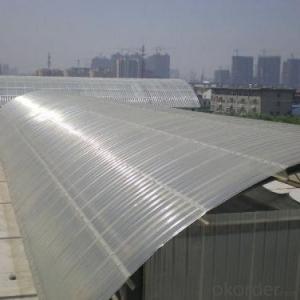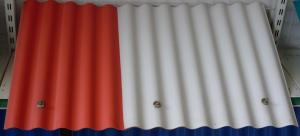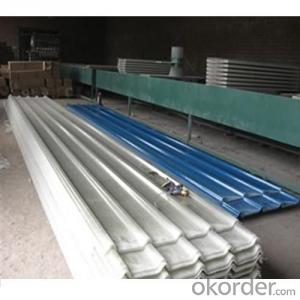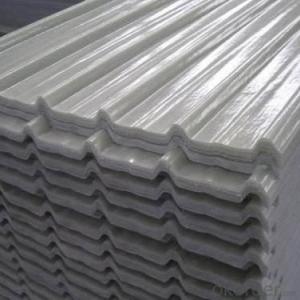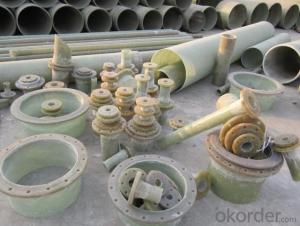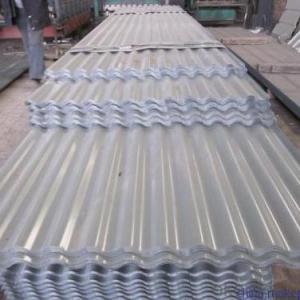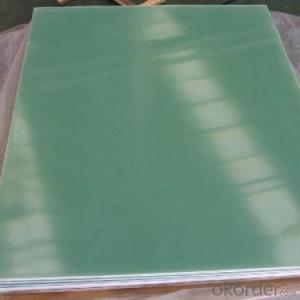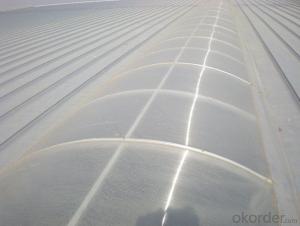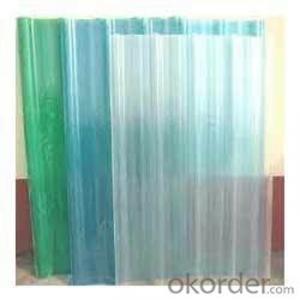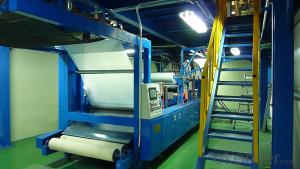FRP Roofing Panel S20
- Loading Port:
- China Main Port
- Payment Terms:
- TT or LC
- Min Order Qty:
- 100Pcs m.t.
- Supply Capability:
- 1000Pcs m.t./month
OKorder Service Pledge
OKorder Financial Service
You Might Also Like
Specification of FRP Roofing Panel S20:
Thickness:3.0mm
Color:sky blue, dark blue, clear, light green, dark green, opal, etc.
Ordinary Wave: 812-203
Length:No limit but with the consideration of transportation
Features of FRP Roofing Panel S20:
1) The fiberglass content of new generation greenhouse panel has been improved by 18.3%
2) Weather resistant and Self-clean ability
3) Excellent yellowness resistance
4) Strong impact resistant and low bending rate
5)Withstand extreme temperature from -38 degree to +110 degree for a long time
6) Aging resistant: specified F4 film added on surface and gel coat makes it endurable
for long.
7) More strengthened, safer, cleaner and more economical greenhouse panel.
8) Mainly serve the big factory, warehouse, super markets and other steel-structured project.
Packaging & Delivery of FRP Roofing Panel S20:
Packaging Detail: standard packing for export
Delivery Detail:3~7 days
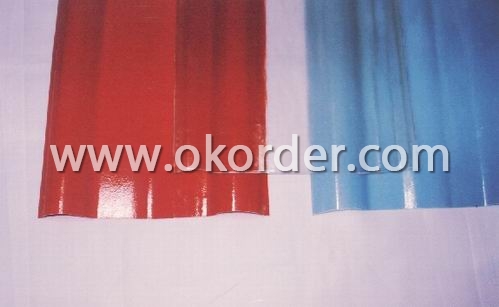
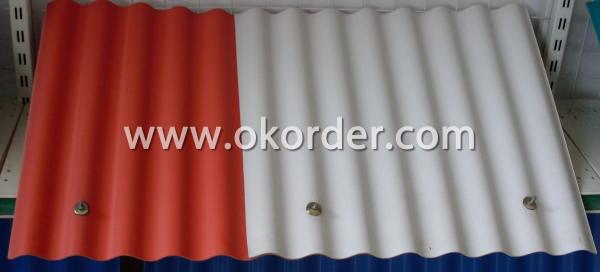
- Q:Can FRP roofing panels be used for covered walkways in shopping malls or retail centers?
- Covered walkways in shopping malls or retail centers can indeed utilize FRP roofing panels. FRP roofing panels, also known as Fiberglass Reinforced Plastic, boast durability, lightweight characteristics, and resilience to various weather conditions. These attributes make them ideal for shielding against rain, snow, and sunlight. Furthermore, the installation and maintenance of FRP roofing panels are hassle-free, which benefits shopping malls or retail centers seeking swift and efficient construction or renovation projects. Additionally, FRP panels can be tailored to meet the specific design and aesthetic requirements of the shopping mall or retail center. Moreover, in comparison to other roofing materials, FRP roofing panels provide a cost-effective solution. Their extended lifespan diminishes the need for frequent replacements or repairs, ultimately resulting in long-term savings. To sum up, FRP roofing panels present a viable choice for covered walkways in shopping malls or retail centers due to their sturdiness, weather resistance, easy installation, customization options, and economical nature.
- Q:Are FRP roofing panels compatible with different types of roofing systems?
- Yes, FRP (Fiberglass Reinforced Plastic) roofing panels are generally compatible with different types of roofing systems. FRP panels are versatile and can be used with various roofing systems including flat roofs, sloped roofs, and metal roofs. They can be installed as a standalone roofing system or as an overlay on top of existing roofs. FRP panels are lightweight, durable, and resistant to corrosion, making them suitable for use in different climates and environments. They can withstand extreme weather conditions, including high winds, heavy rain, and snow. Furthermore, FRP panels can be easily integrated with other roofing materials such as asphalt shingles, metal sheets, or clay tiles. This allows for a seamless transition between different roofing materials, ensuring a watertight and aesthetically pleasing roof system. However, it is important to consult with a professional roofing contractor or manufacturer to ensure the compatibility of FRP panels with specific roofing systems. Factors such as structural support, load-bearing capacity, and installation requirements may vary depending on the type of roofing system. Consulting with experts will help ensure that the FRP panels are installed correctly and in accordance with the manufacturer's guidelines.
- Q:Are FRP roofing panels suitable for residential garages or carports?
- FRP roofing panels are indeed a great choice for residential garages or carports. They possess qualities such as being lightweight, durable, and having exceptional resistance to weathering, UV rays, and impact. This means that they will provide a long-lasting roofing solution while requiring minimal maintenance. Moreover, homeowners can select from a range of colors and profiles to ensure that the design matches their aesthetic preferences. The installation process of FRP panels is relatively simple, making them a practical option for those who enjoy DIY projects. In conclusion, FRP roofing panels offer a cost-effective and dependable alternative for residential garages or carports.
- Q:What is the difference between glass fiber reinforced plastic daylighting tile and glass daylighting tile?
- Mainly in accordance with the classification of resins, ordinary lighting tiles are usually resin and glass fiber or glass mat based raw materials.
- Q:Are FRP roofing panels suitable for industrial applications?
- Yes, FRP (Fiberglass Reinforced Plastic) roofing panels are suitable for industrial applications. They are highly durable, lightweight, and resistant to corrosion, making them ideal for industrial settings where there may be exposure to harsh chemicals, extreme temperatures, or heavy machinery. Additionally, FRP roofing panels offer excellent strength and insulation properties, providing protection and energy efficiency for industrial buildings.
- Q:Can FRP roofing panels be used for greenhouses or agricultural tunnels?
- Yes, FRP (Fiberglass Reinforced Plastic) roofing panels can be used for greenhouses or agricultural tunnels. FRP panels have several properties that make them suitable for these applications. Firstly, FRP panels are lightweight, making them easy to install and reducing the load on the structure. This is particularly important in greenhouse or tunnel construction where the roof needs to support plant growth and potentially heavy snow loads. Secondly, FRP panels are highly durable and resistant to corrosion, which is essential for withstanding the harsh conditions typically found in agricultural environments. They are also resistant to UV radiation, ensuring long-lasting performance even in direct sunlight. Moreover, FRP panels provide excellent light transmission, allowing plants to receive adequate sunlight for photosynthesis. This is crucial for plant growth and productivity in greenhouses or agricultural tunnels. Additionally, the panels can be manufactured with different levels of light diffusion to control the intensity of sunlight and prevent scorching or shadowing of plants. Furthermore, FRP panels have good thermal insulation properties, helping to maintain the desired temperature and humidity levels inside the greenhouse or tunnel. This is important for creating a favorable environment for plant growth and protecting crops from extreme weather conditions. In summary, FRP roofing panels offer numerous advantages, including their lightweight nature, durability, resistance to corrosion and UV radiation, high light transmission, and thermal insulation properties, making them an excellent choice for greenhouses or agricultural tunnels.
- Q:Are FRP roofing panels suitable for water treatment plants or wastewater facilities?
- Water treatment plants and wastewater facilities can benefit from the use of FRP roofing panels. These panels are well-suited for these environments due to their corrosion resistance, durability, and ability to withstand harsh conditions. Specifically designed to handle moisture, chemicals, and UV radiation, FRP panels are an ideal choice for such facilities. There are several advantages offered by FRP roofing panels. Firstly, their lightweight nature makes installation easier and reduces the strain on the building structure. Additionally, they have a high strength-to-weight ratio, enabling them to withstand heavy winds, snow loads, and other environmental pressures. One of the key features of FRP roofing panels is their resistance to corrosion. Given that water treatment plants and wastewater facilities are exposed to highly corrosive substances, such as chemicals, gases, and acidic byproducts, the inherent resistance of FRP panels ensures long-term performance and reduces the need for frequent maintenance or replacement. Moreover, FRP roofing panels are designed to be non-porous, preventing water absorption and the growth of mold, mildew, or bacteria. This is particularly important in water treatment plants and wastewater facilities, where maintaining a hygienic environment is crucial. In conclusion, FRP roofing panels are an excellent choice for water treatment plants and wastewater facilities due to their corrosion resistance, durability, lightweight nature, and ability to withstand harsh environments. They offer long-term performance, reduced maintenance requirements, and a hygienic environment, making them highly suitable for such facilities.
- Q:Do FRP roofing panels require specific safety precautions during installation?
- During the installation of FRP (Fiberglass Reinforced Plastic) roofing panels, it is imperative to take specific safety precautions. Firstly, it is crucial to provide the installers with the necessary safety equipment and ensure its use. This includes safety harnesses, hard hats, gloves, goggles, and non-slip footwear. These safety measures are essential to safeguard installers against potential falls, head injuries, hand injuries, and eye injuries. Secondly, it is important to adhere to proper handling and lifting techniques when working with FRP roofing panels. These panels can be cumbersome and weighty, so it is vital to have an adequate number of personnel and employ appropriate lifting techniques to prevent strains and other lifting-related injuries. Furthermore, it is crucial to exercise caution regarding potential electrical hazards during installation. FRP roofing panels are often installed on structures that may have nearby electrical wiring or equipment. Installers should undergo training to identify and avoid electrical hazards, and it may be necessary to deactivate power in certain areas during installation to minimize the risk of electric shock. Lastly, it is imperative to strictly adhere to the manufacturer's guidelines and instructions for installation. FRP roofing panels may have specific requirements, such as recommended temperatures, adhesives, or fasteners. By following these guidelines, installers can ensure the proper installation of the panels and minimize the risk of accidents or structural failures. In conclusion, specific safety precautions are necessary during the installation of FRP roofing panels. By providing and utilizing the required safety equipment, following appropriate handling and lifting techniques, being cautious of electrical hazards, and adhering to the manufacturer's guidelines, installers can guarantee a safe and successful installation process.
- Q:Can FRP roofing panels be used for convention centers?
- Convention centers can indeed utilize FRP (Fiberglass Reinforced Plastic) roofing panels. There are several advantages associated with FRP panels that make them appropriate for such purposes. To begin with, FRP panels possess a unique combination of being lightweight yet exceptionally strong. This characteristic renders them ideal for large-scale structures like convention centers. They can span considerable distances without requiring additional support structures, thus minimizing construction costs and enabling more flexible design possibilities. Moreover, FRP panels exhibit high resistance to corrosion, weathering, and UV radiation. Consequently, the roofing system remains durable and maintains its appearance over time, even in harsh outdoor environments. Additionally, FRP panels can be manufactured with excellent fire resistance properties, which are essential in ensuring the safety of individuals in extensive public spaces such as convention centers. Furthermore, FRP roofing panels offer exceptional thermal insulation properties, contributing to the regulation of indoor temperatures. This, in turn, leads to energy savings and enhanced comfort for the occupants. Lastly, FRP panels are available in an extensive array of colors, finishes, and profiles. This versatility allows for customization and aesthetic integration with the overall design of the convention center. In conclusion, due to their strength, durability, fire resistance, thermal insulation properties, and design flexibility, FRP roofing panels prove to be a suitable choice for convention centers.
- Q:Can FRP roofing panels be used for skylights in institutional buildings?
- Yes, FRP (Fiberglass Reinforced Plastic) roofing panels can indeed be used for skylights in institutional buildings. FRP panels are known for their durability, lightweight nature, and excellent light transmission properties, making them a popular choice for skylights in various types of buildings, including institutional ones. These panels offer numerous benefits, such as resistance to UV radiation, weathering, and corrosion, making them suitable for long-term use in institutional settings. Additionally, FRP skylight panels are available in different colors, profiles, and sizes, providing flexibility in design and installation. Overall, FRP roofing panels can effectively serve as skylights in institutional buildings, offering durability, excellent light transmission, and a range of design options.
1. Manufacturer Overview |
|
|---|---|
| Location | Shanghai, China |
| Year Established | 1999 |
| Annual Output Value | Above US$ 300,000 |
| Main Markets | Mid East; Eastern Europe; North America |
| Company Certifications | ISO 9002:2000 |
2. Manufacturer Certificates |
|
|---|---|
| a) Certification Name | |
| Range | |
| Reference | |
| Validity Period | |
3. Manufacturer Capability |
|
|---|---|
| a)Trade Capacity | |
| Nearest Port | Shanghai |
| Export Percentage | 41% - 50% |
| No.of Employees in Trade Department | 100 People |
| Language Spoken: | Chinese |
| b)Factory Information | |
| Factory Size: | Above 100,000 square meters |
| No. of Production Lines | Above 5 |
| Contract Manufacturing | OEM Service Offered; Design Service Offered |
| Product Price Range | Average |
Send your message to us
FRP Roofing Panel S20
- Loading Port:
- China Main Port
- Payment Terms:
- TT or LC
- Min Order Qty:
- 100Pcs m.t.
- Supply Capability:
- 1000Pcs m.t./month
OKorder Service Pledge
OKorder Financial Service
Similar products
New products
Hot products
Hot Searches
Related keywords
